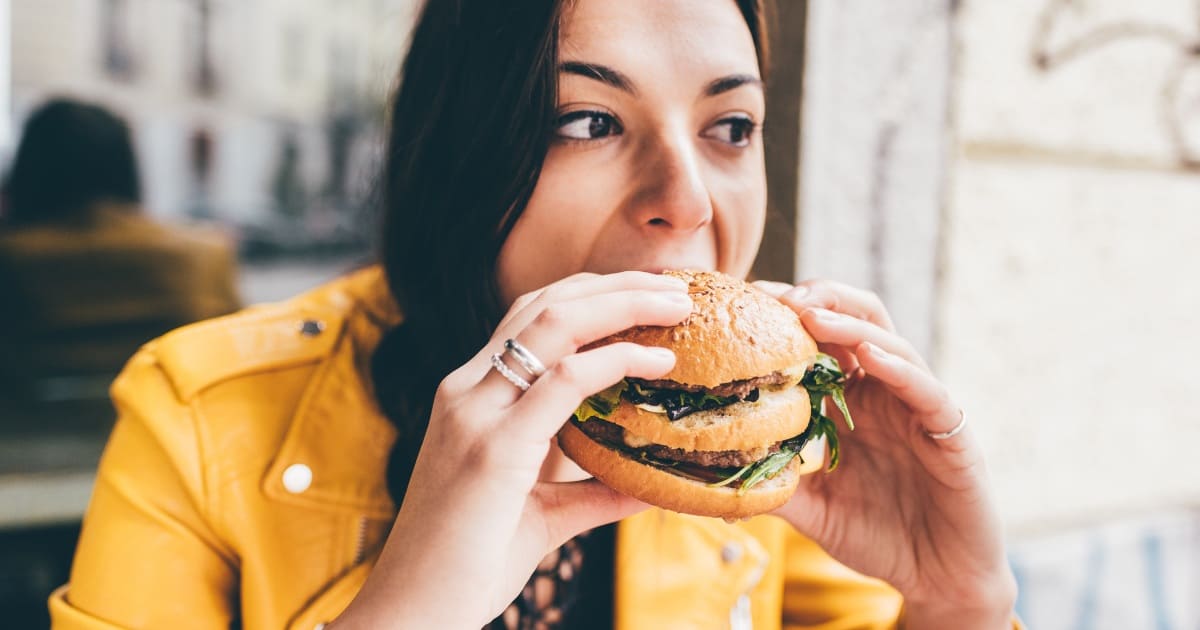Beginning a metformin regimen can be an important first step to help manage your blood sugar levels. But people are often confused about what they should or shouldn’t eat after starting metformin.
This article will investigate what foods you should eat and what you should avoid while taking metformin to ensure that the medicine works its best and to help reduce the risk of some common side effects.

How metformin works
Metformin is an extremely popular prescription drug used to help people with type 2 diabetes better manage their blood sugar levels and maintain (or lose) weight.
Read more in: Metformin and Weight Loss: Can a Pill Help You Lose Weight?
Metformin is also sometimes prescribed to people with conditions such as:
- Prediabetes
- Gestational diabetes (a type of diabetes that occurs during pregnancy)
- Polycystic ovary syndrome (PCOS, a condition in which a woman’s hormones are out of balance, resulting in the development of small, cyst-like sacs on the ovaries)
Metformin helps lower blood sugar levels by reducing the production of glucose from the liver, decreasing sugar absorption in the intestines, and improving the ability of the body’s cells to consume and use sugar for energy.
The medicine can cause a variety of side effects, including gastrointestinal (GI) effects such as decreased appetite, nausea, vomiting, diarrhea, and weight loss. This can make it difficult to know what foods to eat and what foods to avoid.
If you’re struggling to eat enough calories on a day-to-day basis while taking metformin, talk with your doctor about meal plan ideas, or visit a registered dietitian (RD) for help.
Learn more about potential side effects and metformin alternatives in: Metformin Side Effects: What You Need to Know and The Best Alternatives to Metformin for Type 2 Diabetes Management.
Foods to avoid while taking metformin
While no foods are completely off-limits if you’re taking metformin, it is best to limit certain items to make sure that the medication is functioning optimally to help manage your diabetes. Certain foods and alcohol can make metformin much less effective.
The following foods should best be limited or avoided to make the most of your metformin regimen:
Alcohol
In addition to the other negative health effects of the practice, it’s best to avoid binge drinking while taking metformin because the drug interacts negatively with excessive alcohol.
Also, regularly consuming alcohol can worsen kidney and liver issues. If you have kidney disease, non-alcoholic fatty liver disease (NAFLD), or another liver condition, it’s important to speak with your doctor before drinking alcohol while on metformin.
Additionally, it’s important to exercise special caution with mixed drinks — in addition to containing alcohol, they often also have high levels of added sugars, which can negatively affect blood sugar levels.
However, many people do drink alcohol while taking metformin. Moderation is key.
The CDC recommends the following: for women, a moderate amount of alcohol is no more than one drink per day, and for men, a moderate amount is no more than two drinks per day.
Speak with your healthcare provider about what amount of alcohol, if any, is safe to consume for you.
Saturated and trans fats
Diabetes increases the risk of inflammatory conditions such as heart disease. Avoiding saturated and trans fats in general, but especially while taking metformin, can be extremely helpful for helping to avoid worsening inflammation.
Saturated fats can also increase insulin resistance (a condition in which the body does not use insulin efficiently), which can make weight loss and blood sugar management more difficult. Fatty foods additionally contribute to stubborn high blood sugars, which can be problematic over the long term.
Common sources of saturated fats include red meats, cheese, butter, and milk. You don’t need to avoid dairy altogether. Rather, choosing lower-fat options is an excellent way to make sure you’re getting enough protein and calcium in your diet without all the saturated fat.
Common sources of trans fats include processed items, such as stick margarine, shortening, fried foods, microwave popcorn, and commercial baked goods.
Refined carbohydrates and added sugars
Metformin isn’t a magic pill. It helps maintain blood sugar levels and can help with moderate amounts of weight loss, but it works best along with a healthy diet and regular exercise.
Part of eating a healthy diet includes avoiding excess amounts of refined carbohydrates and added sugars. Some common sources include:
- White bread
- White rice
- White (not whole-grain) pasta
- Candy
- Sugar-sweetened soda
- Chips
- Crackers (not whole-grain)
- Ice cream
- Cakes
- Chocolates
- Other sweets
If you often find yourself reaching for these and similar items, managing your blood sugar levels and weight will be difficult, if not impossible.
Instead, according to the 2020-2025 Dietary Guidelines for Americans, you should aim for a balanced, nutritious diet, focusing on fruits; vegetables; whole grains; lean protein sources like chicken, fish, tofu, beans, and turkey; and lower-fat dairy like reduced-fat Greek yogurt, kefir, and mozzarella.
Aim to minimize your consumption of added sugars, salt, saturated and trans fats, as well as cholesterol.
Too much sodium
The average American eats far too much salt, consuming, on average, about 3,400 milligrams (mg) of sodium per day. (Sodium is one of the elements found in salt.)
The Dietary Guidelines for Americans recommends the average adult eat no more than 2,300 mg of sodium each day (equal to about 1 teaspoon of salt).
Too much sodium intake can increase your risk of issues such as high blood pressure and heart disease (two conditions that are already more likely to occur in people with diabetes).
The majority of sodium in the American diet comes from processed and refined foods, including restaurant foods. So, cooking more meals and snacks at home is an easy way to control what goes into your food and cut the salt.
Foods to avoid to prevent gastrointestinal distress
There are no foods that are specifically recommended to avoid diarrhea and other common GI effects of metformin.
That said, there are certain foods and beverages that can increase the risk of GI upset in general, so you may want to reduce your consumption of them if you are experiencing gastrointestinal side effects from metformin. These include:
- Sugar
- Artificial sweeteners
- Dairy products
- Garlic, onions, and other foods high in FODMAPs (certain sugars that are poorly absorbed and may cause intestinal distress)
- Fructose (a natural sugar found in fruit)
- Gluten (a protein found in wheat, rye, barley, and their hybrids)
- Fried or fatty foods
- Spicy foods
- Alcohol
- Caffeine
These changes might help manage GI symptoms while taking metformin.
Foods to eat while taking metformin
There are plenty of foods to enjoy if you’re currently taking metformin.
A general rule of thumb is to adopt a healthy lifestyle and use metformin to supplement this approach.
In terms of diet, be sure to eat plenty of protein (check with your doctor about the right amount to target if you have kidney issues), and follow a lower-carbohydrate, lower-fat eating plan to manage blood sugar levels and support a healthy weight.
Try to focus on the following foods:
- Fresh, whole fruits and berries, such as blueberries, strawberries, raspberries, and blackberries
- Fresh, whole vegetables, such as kale, cauliflower, Brussels sprouts, broccoli, bok choy, cabbage, and other greens
- Lean proteins, such as tofu, turkey, chicken, egg whites, beans, legumes, and fish
- Lower-fat dairy, such as reduced-fat Greek yogurt, cheese, and milk
- Healthy fats, such as extra-virgin olive oil, avocado, coconut, and nuts
- Plain tea and coffee, and plenty of water
- At least 25 grams of fiber per day
Always talk with your doctor and/or meet with a registered dietitian if you’re having trouble planning meals or finding enough nutritious foods that you enjoy.
Frequently asked questions
What diet should I follow when taking metformin?
While no particular diet is absolutely necessary to follow, it is best to eat high-protein, lower-carbohydrate, and lower-fat foods while taking metformin to make sure the medication is as effective as possible. This can help you better manage your blood sugar levels and maintain (or lose) weight.
Aim to include lower-carbohydrate fruits, vegetables, lean protein, lower-fat dairy, and unprocessed, whole foods as much as possible.
What should I watch out for when taking metformin?
Some of the common side effects to be aware of when taking metformin include nausea, diarrhea, vomiting, a decrease in appetite, bloating, and gas.
See more in: Can Metformin Cause Diarrhea?
Taking metformin at the same time every day can help decrease these side effects, and most side effects subside after a few weeks of taking the medication. Call your doctor if you’re experiencing side effects for longer than two weeks.
If you also take insulin, metformin can cause hypoglycemia (low blood sugar levels). This can be dangerous if you’re unable to keep liquids down, so call your doctor immediately if this is the case and you’re having trouble treating low blood sugars.
Another potential risk of taking metformin is that it can cause a decrease in vitamin B12 levels. Prolonged B12 deficiency can result in neurological problems, weakness, and fatigue.
Lactic acidosis is a rare but serious side effect of metformin. It is caused by excess lactic acid building up in the body and is potentially deadly. Symptoms of lactic acidosis include abdominal pain, muscle cramps, difficulty breathing, and fatigue.
Read more in: Can Metformin Cause Lactic Acidosis?
Should I avoid grapefruit when taking metformin?
Grapefruit can interact with certain medications, affecting how they are metabolized and absorbed by the body, which impacts their safety and effectiveness. These medicines are required to have a warning advising people against consuming grapefruit or grapefruit juice.
Currently, there is no evidence to suggest that grapefruit interacts with metformin, and it carries no warning.
What happens if you eat a lot of sugar while taking metformin?
Eating a lot of sugar may happen from time to time. We all want to have cake on our birthdays or otherwise indulge on occasion as a form of celebration or to mark a milestone.
If you eat a lot of sugar while taking metformin, your body will have to work harder to keep your blood sugar levels within a healthy range, and the metformin will not be as effective for weight loss.
However, if it happens infrequently, you should not experience too many negative side effects. The key is moderation.
Final thoughts
Metformin is a common prescription drug used to treat type 2 diabetes. It can help lower blood sugar and HbA1c levels (a measure of glucose control over the previous 2 to 3 months) and it is used to help manage weight.
It’s best to avoid saturated and trans fats, excess alcohol consumption, too much sodium, refined carbohydrates, and processed and added sugars while taking it to achieve maximum blood sugar management benefits.
Aim for a diet full of whole, unprocessed foods including fruits, vegetables, healthy fats, fiber, lean protein, and lower-fat dairy.
When eating a healthier diet and including regular physical activity in your routine, metformin can be a great way to improve your health and prevent diabetes complications.
Suggested next article: Everything You Need to Know About Metformin.





Jackson Mooketsa
Hello there I am diabetic im taking Metformin 1000mg but my feet have been painful for a while now what can be the Cos of that?
Christel Oerum
If you have concerns about side effects you should bring it up with your doctor. It’s likely though, that nerve pain is related to elevated blood sugars, so you’d want to discuss that with your doctor as well.
Allan Glazer DPM
Good info on Metformin but I disagree with you on the low fat aspect. Diabetics should not be eating low fat food products which substitute carbs for the sugar. FAT is not bad – when taken on a low carb diet. It is when it is combined with a higher carb diet that can create problems. Also, you do not mention that having too much protein an also effect a persons glucose after a meal. Each person ( diabetic) has to find their own level that works for them.
Many people have found that a Keto type diet works for them. Also, intermittent fasting is a great way to control your weight and diabetes.
Cecile Schoenfeld
I have been reading books, one is extremely well researched showing the keto diet works temporarily but can be dangerous long term with heart problems and this is the fat that creates problems and not the carbohydrates but because it is often taken together the carbohydrates take the blame when the fat should. What is mostly recommended in those is a vegetarian diet with lots of green and moderation even on fat from plants (ex: avocadoe). The other book from a medical psychic says exactly the same.